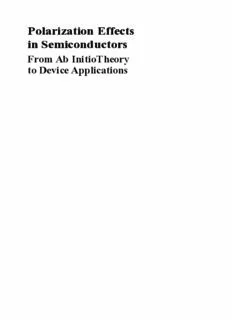
Polarization Effects in Semiconductors: From Ab InitioTheory to Device Applications PDF
Preview Polarization Effects in Semiconductors: From Ab InitioTheory to Device Applications
Polarization Effects in Semiconductors From Ab InitioTheory to Device Applications Colin Wood Debdeep Jena • Editors Polarization Effects in Semiconductors From Ab InitioTheory to Device Applications 123 Colin Wood Debdeep Jena US Office of Naval Research University of Notre Dame Arlington, VA Notre Dame, IN USA USA Library of Congress Control Number: 2007932418 ISBN 978-0-387-36831-3 e-ISBN 978-0-387- 68319-5 Printedonacid-freepaper. c 2008SpringerScience+BusinessMedia,LLC (cid:176) Allrightsreserved.Thisworkmaynotbetranslatedorcopiedinwholeorinpartwithoutthewritten permissionofthepublisher(SpringerScience+BusinessMedia,LLC,233SpringStreet,NewYork,NY 10013,USA),exceptforbriefexcerptsinconnectionwithreviewsorscholarlyanalysis.Useinconnection withanyformofinformationstorageandretrieval,electronicadaptation,computersoftware,orbysimilar ordissimilarmethodologynowknownorhereafterdevelopedisforbidden. Theuseinthispublicationoftradenames,trademarks,servicemarks,andsimilarterms,eveniftheyare notidentifiedassuch,isnottobetakenasanexpressionofopinionastowhetherornottheyaresubject toproprietaryrights. 9 8 7 6 5 4 3 2 1 springer.com Preface In the last two decades basic semiconductor research has increasingly focussed attention away from cubic crystal III-V and II-VI compounds toward the “wide- bandgapsemiconductors”Ga,Al,Inbinaryandternarynitrides,andsiliconcarbide. Thesesmalleranioncompoundspackmoredenselyinhexagonalcrystals,withthe consequenceofveryhighspontaneousanddeformationinducedelectrostaticpolar- ization. Theimportanceandpotentialfunctionalityofwasrapidlyrecognizedinthelate 1990s. In 2000 the Multi-disciplinary University Research Initiative (MURI) of “Polarization Effects in Wide Bandgap Semiconductors” was initiated by the Of- fice of Naval Research to accelerate and consolidate understanding, engineering anddevice applicationof the extra electro-physicalparameterspace. Thewinning program,“Polaris”byteamscenteredatUCSanDiego,andCornellUniversity,was oneofthemostproductiveinthehistoryoftheMURIprogram,andistestamentto thevalueofsponsoredcollaborativeresearchsoardentlydefendedbytheDirector ofDefenseResearchandEngineering(DDR&E)OfficeoftheSecretaryofDefense (OSD). Electronicpolarizationhasprofoundconsequencesontheelectrostaticsandelec- trodynamics of epitaxial films and heterostructures. Polaris team members devel- opedacomprehensivescientificunderstandingandmademanyconceptualadvances inpolarization-relatedsemiconductorphysics.Asaresult,manyelectronicandop- ticaldeviceshavebeensignificantlyimprovedandnoveldevicesconceivedandre- alized. This book is an attempt to ensure that the pioneering advances of the Polaris investigatorsare collected and expandedto allow efficient recognition and under- standingofthemanynewscientificandengineeringprinciples,considerationsand applicationsdevelopedinthe5yearprogram. Eachchapteraddressesaspectsofpolarizationeffectsfroma differentperspec- tive, and for differentpurposes.There is some overlapin the introductorycontent in several chapters, albeit each with its own unique flavor. The editors decided to retain this formatas it serves to make each chapterself-contained,so that readers v vi Preface have the optionof perusingthem independentlywithoutloss of continuity,and to guidereadersmoreeffectivelytothesubtledifferencesinperspectives. Arlington,VA ColinWood NotreDame,IN DebdeepJena Contributors P.Alpay MaterialsScienceandEngineeringProgram& Instituteof MaterialsSciences, UniversityofConnecticut,Storrs,CT06269USA,e-mail:[email protected] O.Ambacher InstituteofMicro-andNanotechnologies,TechnicalUniversityIlmenau,D-98693 Ilmenau,Germany,e-mail:[email protected] P.M.Asbeck Departmentof ElectricalandComputerEngineering,UniversityofCalifornia, SanDiego,CA92093USA,e-mail:[email protected] J.Bernholc CenterforHighPerformanceSimulation&DepartmentofPhysics,NorthCarolina StateUniversity,Raleigh,NC27695,USA,e-mail:[email protected] P.Boguslawski Institue of Physics, Polish Academyof Sciences, Al. Lotnikow32/46,02-668 Warsaw,Poland,e-mail:[email protected] R.Butte´ LaboratoryofAdvancedSemiconductorsforPhotonicsandElectronics(LASPE), EPFL,Station3,CH-1015,Lausanne,Switzerland,e-mail:raphael.butte@epfl.ch M.V.S.Chandrashekhar ElectricalandComputerEngineering,CornellUniversity,Ithaca,NY14853,USA, e-mail:[email protected] V.Cimalla InstituteofMicro-andNanotechnologies,TechnicalUniversityIlmenau,D-98693 Ilmenau,Germany,e-mail:[email protected] N.Grandjean LaboratoryofAdvancedSemiconductorsforPhotonicsandElectronics(LASPE), vii viii Contributors EPFL,Station3,CH-1015,Lausanne,Switzerland, e-mail:nicolas.grandjean@epfl.ch D.Jena DepartmentofElectricalEngineering,UniversityofNotreDame,NotreDame,IN 46556USA,e-mail:[email protected] G.Koley DepartmentofElectricalEngineering,UniversityofSouthCarolina,Columbia,SC 29208,USA,e-mail:[email protected] J.Leach Departmentof ElectricalandComputerEngineering,VirginiaCommonwealth University,Richmond,VA23284,USA,e-mail:[email protected] J.Mantese UnitedTechnologiesResearchCenter,411SilverLane,MS129-45,EastHartford, CT06108,USA,e-mail:[email protected] H.Morkoc¸ Departmentof ElectricalandComputerEngineering,VirginiaCommonwealth University,Richmond,VA23284,USA,e-mail:[email protected] J.Singh Electrical Engineeringand Computer Science Dept. University of Michigan, AnnArbor,MI48109,USA,e-mail:[email protected] M.Singh Electrical Engineeringand Computer Science Dept. University of Michigan, AnnArbor,MI48109,USA,e-mail:[email protected] M.G.Spencer ElectricalandComputerEngineeringDept.CornellUniversity,Ithaca,NY14853, USA,e-mail:[email protected] C.I.Thomas ElectricalandComputerEngineeringDept.CornellUniversity,Ithaca,NY14853, USA,e-mail:[email protected] Y.-R.Wu AssistantProfessor,NationalTaiwanUniversity,GraduateInstituteofPhotonics andOptoelectronicsandDepartmentofElectricalEngineering,MD617,No1. RooseveltRoadSec.4,Taipei10617,Taiwan,e-mail:[email protected] E.T.Yu ElectricalandComputerEngineeringDept.UniversityofCalifornia,SanDiego, CA92093USAe-mail:[email protected] Contents TheoreticalApproachtoPolarizationEffectsinSemiconductors........ 1 PiotrBoguslawskiandJ.Bernholc 1 Introduction.............................................. 1 2 BasicElectrostatics........................................ 2 3 Polarization .............................................. 4 4 AbInitioCalculationsoftheElectronicStructure............... 5 5 ModernTheoryofPolarization.............................. 6 6 PolarizationatInterfaces:InterfaceDipoles ................... 10 6.1 AveragingMicroscopicChargesandField............. 10 6.2 AlAs/GaAsSuperlattice ............................ 11 7 SpontaneousPolarizationintheWurtziteStructure:BeO ........ 12 8 GaN/AlN Superlattice: Spontaneous Polarization andPiezoelectricity ....................................... 13 9 ElectricField-DrivenDiffusionandSegregationofDopants inSuperlattices ........................................... 16 9.1 Introduction ...................................... 16 9.2 InterfacialSegregation ............................. 17 9.3 ProfileofHinAlN/GaNSuperlattice................. 19 10 Summary ................................................ 23 References..................................................... 24 PolarizationInducedEffectsinGaN-basedHeterostructuresandNovel Sensors ........................................................ 27 O.AmbacherandV.Cimalla 1 Introduction.............................................. 27 2 First-PrinciplesPredictionofStructuralandPyroelectricProperties 29 3 Lattice Constants, AverageBondLengthand BondAngles inTernaryCompounds..................................... 30 4 Polarity.................................................. 40 5 GrowthofUndopedAlGaN/GaN,InGaN/GaNandAlInN/GaN Hetero-andNanostructures................................. 41 ix x Contents 5.1 AlGaN/GaNHeterostructures ....................... 41 5.2 InGaN/GaNHeterostructures........................ 42 5.3 AlInN/GaNHeterostructures ........................ 42 6 Non-Linear Spontaneousand Piezoelectric Polarization inGroup-III-Nitrides ...................................... 42 6.1 SpontaneousPolarization........................... 43 6.2 PiezoelectricPolarization........................... 45 7 PolarizationInducedSurfaceandInterfaceCharges............. 56 8 SheetCarrierConcentrationofPolarizationInduced2DEGs ..... 61 8.1 2DEGsConfinedatInterfacesofUndopedGa-face AlGaN/GaNHeterostructures ....................... 63 8.2 2DEGsConfinedatInterfacesofUndoped,Ga-face AlInN/GaNHeterostructures ........................ 65 8.3 2DEGsConfinedinInGaN/GaNSingleQuantumWells . 69 9 SensorsBasedonPolarizationInduced2DEGs ................ 74 9.1 Overview ........................................ 74 9.2 SurfaceSensitiveSensors........................... 75 9.3 MechanicalSensors................................ 92 9.4 SensorforElectromagneticFields.................... 98 10 Summary ................................................100 References.....................................................103 Lateral and Vertical Charge Transport in Polar Nitride Heterostructures: ............................................... 111 Yuh-RennWu,MadhusudanSingh,andJaspritSingh 1 PolarHeterostructures:WhatDoTheyOffer?..................111 1.1 PolarHeterostructures:UndopedElectronics...........112 1.2 TheApplicationsofNitrides ........................113 1.3 TransportIssuesinNitrideDevice ...................115 1.4 PolarMaterials:UseinSensorTechnology–Potential ofMergingPolarMaterialswithSemiconductors.......115 2 TheoreticalApproach......................................117 2.1 PolarizationbyStrain ..............................117 2.2 VerticalJunctionTransport..........................119 2.3 LateralTransportinUndopedHEMTs ................123 2.4 k·p Methodfor Strained Nitride QuantumWells andQuantumDots.................................127 3 TailoringofVerticalJunctions...............................128 3.1 GateLeakageSuppression..........................129 3.2 FormingOhmicContactsbyUsingPolarizationEffects..132 4 NitrideHFETS:TransportIssues ............................134 4.1 NonlinearAccessResistanceandGaNDeviceOperation 135 4.2 ScalingIssuesinNitrideHEMTs ....................139 5 SmartHFETs:Multi-FunctionalDevices......................142 5.1 StressandStrainCalculation ........................145 5.2 Pyroelectricity ....................................146 Contents xi 5.3 StrainSensorFETs:Results.........................147 5.4 ThermalSensorFETs..............................150 5.5 EffectsofDefects .................................152 6 Conclusions..............................................154 References.....................................................154 PolarizationEffectsonLow-FieldTransport&MobilityinIII-VNitride HEMTs........................................................ 161 DebdeepJena 1 Introduction..............................................161 2 Polarization-Induced2DEGsinAlGaN/GaNHEMTs ...........163 2.1 PolarizationEffectsonChargeTransportandScattering .163 2.2 ChargeControl ...................................164 2.3 SurveyofExperimental2DEGMobilityData ..........169 2.4 TheoreticalTools to AddressAlGaN/GaN 2DEG Mobilities........................................171 3 ScatteringMechanisms ....................................171 3.1 TypicalAlGaN/GaN2DEGStructures................171 3.2 TraditionalScatteringMechanisms...................172 3.3 NovelScatteringMechanismsinAlGaN/GaN2DEGs...182 4 UsingTheorytoExplainExperimentalData...................194 5 SummaryandConclusions .................................198 6 AppendixontheTheoryofLow-FieldTransport&Mobility .....198 6.1 TheBoltzmannTransportEquation...................199 6.2 Mobility-BasicTheory .............................203 6.3 StatisticsforTwo-andThree-DimensionalCarriers .....206 6.4 ScreeningbyTwo-andThree-DimensionalCarriers.....207 6.5 Mobilityof2DEGs ................................208 6.6 MaterialPropertiesofIII-VNitridesRelevant toTransport ......................................211 References.....................................................214 LocalPolarizationEffectsinNitrideHeterostructuresandDevices ...... 217 E.T.YuandP.M.Asbeck 1 Introduction..............................................217 1.1 BasicPhysicsofPolarizationEffects .................217 1.2 ExperimentalDeterminationofPolarizationCharge Densities.........................................219 1.3 ConsequencesforHeterostructures,Defects,andDevices 224 2 Polarization-BasedEngineeringofNitrideHeterostructures......225 2.1 EnhancementofSchottkyBarrierHeightinHFET Structures........................................229 2.2 Polarization-BasedEnergyBarrierEngineering ........230 2.3 ResidualStressandPiezoelectricEffectsinGaNHFETs.235 2.4 PolarizationEffectsinNitride-BasedHBTsandp-Type Structures........................................238
Description: